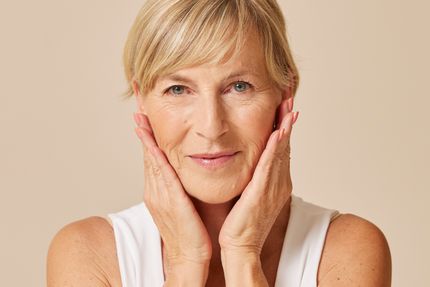Bowel problems and menopause
Your gut and hormones are intimately connected. In midlife, hormonal changes during menopause can affect your gut health and metabolism, causing symptoms like constipation, diarrhoea or even bowel inflammation. Many women start to have bowel problems during perimenopause, the stage leading up to menopause. What exactly is happening in your body? And how do you deal with bowel problems?

Since I’m in perimenopause, I’ve been dealing with diarrhoea. I’ve tried paying attention to what I eat, but this doesn’t seem to help. Why not? - Thea (age 49)

Bowel and digestive problems are symptoms of menopause that many women experience. Although common, they can cause significant discomfort and distress. In some women, intestinal complaints cause a change in stool pattern (constipation or diarrhoea), or they can manifest as abdominal pain, bloating or stomach cramps.
Most women will experience bowel and digestive problems in the years surrounding their final menstrual period (the menopause), when hormone fluctuations are most dramatic. In postmenopause, once the body adjusts to a new hormonal environment and hormone levels remain at a constant low level, most symptoms will improve or completely disappear.
What is happening in your body?
Your digestive tract, also known as the gut, is a complex organ that relies on the support of hormones. During perimenopause, progesterone levels drop faster than oestrogen levels, causing an oestrogen dominance effect in the body. As a result, the body retains fluid, causing your stools to become harder. Over time, this can lead to constipation, which is often accompanied by unpleasant side effects such as a bloated feeling or flatulence (passing wind).
As you move towards menopause and hormone levels decrease further, this can also affect your bowel muscles. Low hormone levels can speed up or slow down your metabolism, resulting in diarrhoea or constipation.
Other causes
Bowel and digestive problems can also be caused by something other than hormonal imbalances. You may have developed an intolerance or allergy, such as a lactose or gluten intolerance. Also, elevated cortisol levels (caused by outside factors such as chronic stress and constantly being 'on guard') can slow down or speed up digestion, which can cause diarrhoea, slow movement of waste through the digestive system or inflammation of your digestive tract.
Bowel problems can also be a side effect of medicines you're taking or a sign of an underlying health condition. Last but not least, other menopausal symptoms, such as joint pain, loss of muscle mass and poor sleep, can also affect general well-being and contribute to bowel problems.
The relationship between the gut microbiome and menopause
Also known as gut microbiome, your intestinal flora is composed of billions of bacteria and micro-organisms that live inside your intestines (gut). The gut microbiome plays a crucial role in your digestion and needs special attention in order for you to stay healthy. The more diverse the communities of bacteria inside your gut, the better. They are responsible for breaking down food and extracting the nutrients that your body needs to function properly.
Hormonal changes during the menopausal transition, as well as stress and an unhealthy diet, can alter the gut microbiome, causing the ‘bad’ bacteria to crowd out the ‘good’ ones in your gut. This can cause problems with your digestion or metabolism and increase your risk of bowel disease.
What can you do?
The first step in finding a solution to any problem is to determine the source. Is menopause to blame for your bowel problems or are they caused by other factors (or a combination of several factors)? Once you've found the answer to this question, you can get started with these tips:
- Feed the good bacteria in your gut. Enrich your diet with probiotic foods, such as yoghurt, raw butter milk, kefir, sauerkraut and brottrunk (a fermented grain beverage). You could also consider taking a supplement.
- Increase your intake of high-fibre foods. Eating fibre helps with digestion and supports gut health. Whole grains, legumes, and whole fruits and vegetables are all great sources of fibre.
- Limit your sugar intake. Avoid foods with added sugars, such as soft drinks, sweets and cookies. Excessive sugar has a negative impact on digestion and the gut microbiome.
- Make sure you drink sufficient fluids to prevent constipation. Try to drink 1.5 to 2 litres per day, preferably filtered water or herbal tea. Drinking a glass of lukewarm water in the morning on an empty stomach helps stimulate the digestive system and boosts metabolism.
- Keep your body (and gut) moving. Regular, moderate physical activity (cycling, yoga, walking) promotes healthy digestion. According to research, walking after a meal helps stabilise blood sugar levels and improve mood.
- Cut down on alcohol and coffee. Caffeine and alcohol irritate the stomach and gut. They also cause your body to expel lots of water, which may lead to dehydration and constipation.
- Consider taking dietary supplements that support your gut flora. For example, probiotics, prebiotics or psyllium husk. Psyllium husk is a prebiotic that increases stool weight and promotes laxation.
Your path to a smooth menopause starts here
Get the tools you need to navigate menopause with more ease and to educate yourself about your body. With tips and insights from experts, and relatable stories of women just like you. Press play, not pause.
What treatment is right for you?
Get extra support if you need it. If you are suffering from multiple menopausal symptoms and lifestyle adjustments are not helping to reduce them, therapy with (bioidentical) hormones might help.
Can hormone therapy help?
Hormone replacement therapy (HRT) replaces lost hormones to counteract severe menopausal symptoms like hot flashes. If you're also suffering from other symptoms besides bowel problems, then HRT might be an option for you. For many women, HRT has been a lifesaver.
Sources
- Colberg SR, Zarrabi L, Bennington L, Nakave A, Thomas Somma C, Swain DP, Sechrist SR. (2009). Postprandial walking is better for lowering the glycemic effect of dinner than pre-dinner exercise in type 2 diabetic individuals. PMID: 19560716.
- Peters, B. A., Santoro, N., Kaplan, R. C., & Qi, Q. (2022). Spotlight on the Gut Microbiome in Menopause: Current Insights. International journal of women's health, 14, 1059–1072.
- Peters, B. A., Lin, J., Qi, Q., Usyk, M., Isasi, C. R., Mossavar-Rahmani, Y., Derby, C. A., Santoro, N., Perreira, K. M., Daviglus, M. L., Kominiarek, M. A., Cai, J., Knight, R., Burk, R. D., & Kaplan, R. C. (2022). Menopause Is Associated with an Altered Gut Microbiome and Estrobolome, with Implications for Adverse Cardiometabolic Risk in the Hispanic Community Health Study/Study of Latinos. mSystems, 7(3), e0027322. https://journals.asm.org/doi/10.1128/msystems.00273-22
- Stachenfeld N. S. (2014). Hormonal changes during menopause and the impact on fluid regulation. Reproductive sciences (Thousand Oaks, Calif.), 21(5), 555–561. https://link.springer.com/article/10.1177/1933719113518992
- Zhang, S., Wang, R., Li, D., Zhao, L., & Zhu, L. (2021). Role of gut microbiota in functional constipation. Gastroenterology report, 9(5), 392–401. https://academic.oup.com/gastro/article/9/5/392/6342866
- Jalanka J, Major G, Murray K, Singh G, Nowak A, Kurtz C, Silos-Santiago I, Johnston JM, de Vos WM, Spiller R. (2019). The Effect of Psyllium Husk on Intestinal Microbiota in Constipated Patients and Healthy Controls. PMID: 30669509.
Tips and advice


FAQ
When should I see a doctor for bowel problems?
Make an appointment to see your doctor if you have severe symptoms, such as bloody stools, persistent nausea or severe abdominal pain. These symptoms may be signs of a serious condition.
How do I know if I have a food intolerance?
If you have a reaction after eating a particular food on a regular basis, you should see your doctor to determine whether you have a food intolerance or a food allergy.












